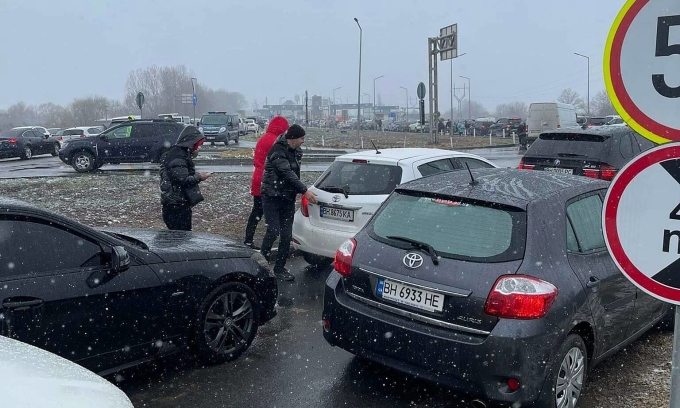Thien hurriedly answers the phone while packing his clothes to prepare to evacuate the southern Ukrainian port city of Odessa and leave for Moldova.
Thien tells VnExpress by phone on the afternoon of Feb. 28 (night Hanoi time): “Tomorrow I will go to Moldova and stay there for a week. Many people here go to Lviv in western Ukraine. But I belong to a different group. I’ll evacuate first, and if it is safe I will tell my father, mother and brother to do the same”.
He was planning to leave in the morning when the curfew was lifted. The route he and his group planned to take from Odessa to the Moldovan border stretched around 300 kilometers.
At the border, if he could not drive on, he planned to leave his family car behind and proceed on foot.
 |
|
Cars wait to cross the border between Ukraine and Moldova on the morning of March 1, 2022. Photo courtesy of Thien |
Odessa is Ukraine’s third largest city with a population of over one million. The ‘Pearl of the Black Sea’ has many large ports, an airport and a naval base.
On the day Russian President Vladimir Putin announced the start of a special military operation in Ukraine, the city became one of the top targets for pre-emptive airstrikes.
The people of Odessa heard many loud explosions and the naval base was the first target of bombardment.
Thien said: “Over the past few days the Russian army has mainly shelled the port areas. Sirens go off every day. My house is situated in the city, and I am worried because it is four kilometers from the airport and eight kilometers from the military barracks”.
He said the situation in the city had not been too tense and he had planned to see what came of the Russia-Ukraine negotiations before making a decision.
But he also feared that things could get complicated and it would become too late for him to evacuate.
His group consists of around 50 people all driving their own vehicles.
He said the evacuation had been a difficult decision to make and the road also held many risks: one person in Odessa was killed by stray bullets while driving in a street during the curfew.
Vietnamese communities in Poland, Slovakia, Moldova and other nations around Ukraine are urgently mobilizing resources and arranging accommodation for evacuees from Ukraine.
Contact points, instructions for moving and border procedures are constantly shared on ‘Supporting Vietnamese Ukrainians’, an online community group, since the military operation first started.
However, evacuating to safety is not simple. Many Vietnamese are still stuck in the conflict zone because there is no safe corridor for civilians. Some members of the aforementioned support group believe that the best way is to stay put in bunkers and wait for the situation to ease. They are afraid people can get hit by stray bullets while evacuating.
Minh Hoang, a PhD student in Kharkiv city, said: “The area near where I live has been heavily bombarded. The dormitory has been without power for the past three days. Today I tried to go to the main building of the school to stay and charge my phone, but on the way artillery shells were fired quite close to where I was. Fortunately, some locals let me take shelter in their house and charge my phone. I am very grateful to them”.
According to local media and Ukrainian officials, Russian light military vehicles and infantry attacked Kharkiv from the north on Feb. 27 but were repelled after intense resistance.
The Russian troops then moved to encircle the city and continued to fire on targets. Pictures on social media showed shells falling in residential areas.
Hoang said: “I knew that it was dangerous to go out. But when I saw the situation ease a bit, I made a run for it. There was no power around the dormitory. I couldn’t contact anyone all day and was really afraid. I walked around while observing the surroundings, praying for my safety”.
It only takes seven to 10 minutes from the dormitory to the main building, but the usual path has now become too risky with artillery shells falling, he said, adding that, besides, fighting between Russian troops and Ukrainian forces defending the city could break out at any time.
The military operation in Ukraine is now into its seventh day, with Russian forces encountering significant resistance from the Ukrainian army.
On February 27 the two nations agreed to start negotiations. The first round took place the next day in Belarus, ending after more than five hours. The officials then returned to their capitals for consultations and plan to hold more ceasefire talks.
The Ukrainian armed forces said Russian forces “continued shelling from almost all directions”.
Hoang said his dormitory has a basement, but in recent days he has been mainly staying on the first floor, only running down to take refuge when he heard air raid sirens.
On the night of Feb. 28 he went down to the bunker to sleep when he saw that the situation remained tense.
“I stayed in a part of the [first] floor where there are two thick layers of walls. However, I decided to sleep in the basement tonight because I fear the negotiations between the parties will not go anywhere. It seems that the fighting will continue to escalate”.
- Reduce Hair Loss with PURA D’OR Gold Label Shampoo
- Castor Oil Has Made a “Huge” Difference With Hair and Brow Growth
- Excessive hair loss in men: Signs of illness that cannot be subjective
- Dịch Vụ SEO Website ở Los Angeles, CA: đưa trang web doanh nghiệp bạn lên top Google
- Nails Salon Sierra Madre
 VnExpress News The News Gateway of Vietnam
VnExpress News The News Gateway of Vietnam





